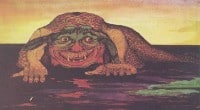
WILL GOOGLE LOSE RIGHTS TO THE NAME?

A 1913 book dredges up a monster battle
- Dateline
- 12 December 2011
The family of the author of a bizarre 1913 book are taking Google Inc. to court for use of the name ‘Google’ and are demanding a share of the company’s profits over the last decade.
Google was started by two Stanford students, Sergey Brin and Larry page, in a garage in 1998. The story goes that ‘Google’ was a deliberate misspelling of the mathematical term ‘googol’ – for a one followed by a hundred zeros.
Perhaps they should have checked, but 85 years before that date a British economist Vincent Cartwright Vickers had used the term ‘Google’ as the title of his book.
‘The Google book’ was published in 1913 in a limited edition of just 100 copies. It was reprinted in 1931 and 1979.
It is a somewhat weird children’s book about a monster called Google included surrealist illustrations of fictitious birds created by the author.
“All the birds try to avoid the Google, because they don’t like him and he frightens them….The sun is setting – can’t you hear a something in the distance howl!!? I wonder if it is – Yes!! it is. That horrid Google on the prowl!!!”
To many, that may sound just like the bleating of some consumers about the new projects Google is flighting – such as Google Street View.
Vickers wrote and illustrated the book while serving as Governor of the Bank of England. The Google Book is considered by some to be insight into Vickers’s insanity.
His family now want to capitalize on his work – which earned him nothing in his lifetime. They could well change all that.
Links to related stories
Warning: Hazardous thinking at work
Despite appearances to the contrary, Futureworld cannot and does not predict the future. Our Mindbullets scenarios are fictitious and designed purely to explore possible futures, challenge and stimulate strategic thinking. Use these at your own risk. Any reference to actual people, entities or events is entirely allegorical. Copyright Futureworld International Limited. Reproduction or distribution permitted only with recognition of Copyright and the inclusion of this disclaimer.